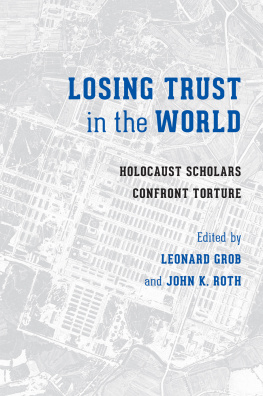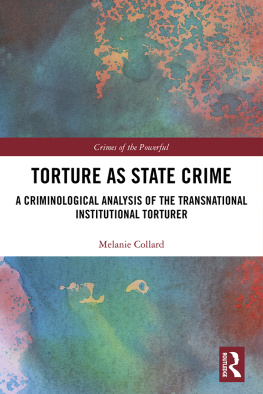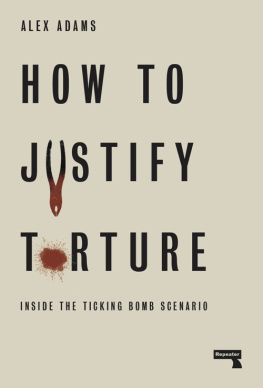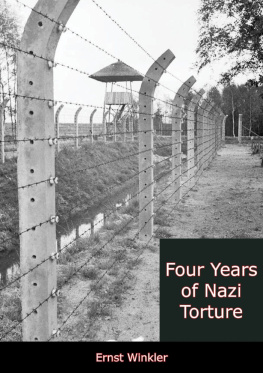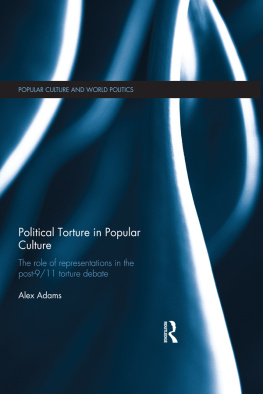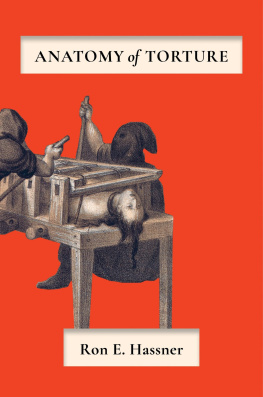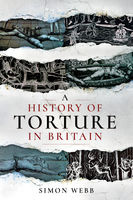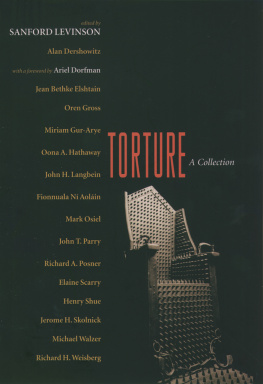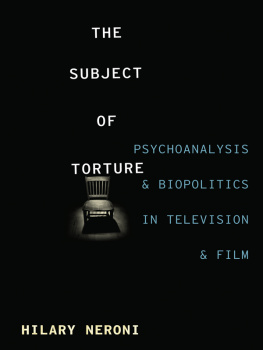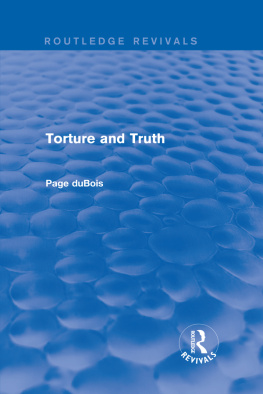

THE STEPHEN S. WEINSTEIN SERIES
in Post-Holocaust Studies
The Stephen S. Weinstein Series in Post-Holocaust Studies carries on the work and publications of the Pastora Goldner Series (20042007), exploring questions that continue to haunt humanity in the aftermath of Nazi Germanys attempt to destroy Jewish life and culture. Books in this series address the most current and pressing issues of our post-Holocaust world. They are grounded in scholarship undertaken by the Stephen S. Weinstein Holocaust Symposium, whose membershipinternational, interdisciplinary, interfaith, and intergenerationalis committed to dialogue as a fundamental form of inquiry and understanding. The symposium and the series are generously supported by Stephen S. Weinstein, who, with his wife, Nancy, is dedicated to the work of tikkun olam, the healing of the world, and whose commitment to combating present-day evils in our world has inspired the participants in the symposium who contribute to this series.
Series Editors
DAVID PATTERSON
University of Texas
JOHN K. ROTH
Claremont McKenna College
Editorial Board
MARGARET BREARLEY
London, England
MYRNA GOLDENBERG
Bethesda, Maryland
HUBERT G. LOCKE
University of Washington
ROCHELLE L. MILLEN
Wittenberg University
THE STEPHEN S. WEINSTEIN SERIES
in Post-Holocaust Studies
After-Words: Post-Holocaust Struggles with Forgiveness, Reconciliation, Justice (2004)
Edited and Introduced by David Patterson and John K. Roth
Fire in the Ashes: God, Evil, and the Holocaust (2005)
Edited and Introduced by David Patterson and John K. Roth
Open Wounds: The Crisis of Jewish Thought in the Aftermath of the Holocaust (2006)
By David Patterson
Testimony, Tensions, and Tikkun: Reflections on Teaching the Holocaust in Colleges and Universities (2007)
Edited and Introduced by Myrna Goldenberg and Rochelle L. Millen
Disappearing Traces: Holocaust Testimonies, Ethics, and Aesthetics (2012)
By Dorota Glowacka
Encountering the Stranger: A Jewish-Christian-Muslim Trialogue (2012)
Edited and Introduced by Leonard Grob and John K. Roth
Different Horrors, Same Hell: Gender and the Holocaust (2013)
Edited and Introduced by Myrna Goldenberg and Amy H. Shapiro
Losing Trust in the World: Holocaust Scholars Confront Torture (2017)
Edited and Introduced by Leonard Grob and John K. Roth
Facing Death: Confronting Mortality in the Holocaust and Ourselves (2017)
Edited and Introduced by Sarah K. Pinnock
Losing Trust in the World
Holocaust Scholars Confront Torture
Edited and Introduced by
LEONARD GROB and JOHN K. ROTH
A Samuel and Althea Stroum Book
UNIVERSITY OF WASHINGTON PRESS
Seattle and London
Losing Trust in the World is published with the assistance of a grant from the Samuel and Althea Stroum Endowed Book Fund.
2017 by the University of Washington Press
Printed and bound in the United States of America
21 20 19 18 175 4 3 2 1
All rights reserved. No part of this publication may be reproduced or transmitted in any form or by any means, electronic or mechanical, including photocopy, recording, or any information storage or retrieval system, without permission in writing from the publisher.
UNIVERSITY OF WASHINGTON PRESS
www.washington.edu/uwpress
LIBRARY OF CONGRESS CATALOGING-IN-PUBLICATION DATA
Names: Grob, Leonard, editor. | Grob, Leonard. Torture during the Holocaust: responsible witnessing. Container of (work):
Title: Losing trust in the world : Holocaust scholars confront torture / edited and Introduced by Leonard Grob and John K. Roth.
Description: Seattle ; London : University of Washington Press, [2017] | ?2017 | Series: The Stephen S. Weinstein series in post-Holocaust studies | Includes bibliographical references and index.
Identifiers: LCCN 2016008401 | ISBN 9780295998459 (hardcover : alk. paper) | ISBN 9780295998466 (pbk. : alk. paper)
Subjects: LCSH: TortureHistory20th century. | TortureHistory21st century. | TortureMoral and ethical aspects. | Holocaust, Jewish (19391945)Historiography.
Classification: LCC HV8593 .L67 2017 | DDC 364.6/7dc23
LC record available at http://lccn.loc.gov/2016008401
The paper used in this publication is acid-free and meets the minimum requirements of American National Standard for Information SciencesPermanence of Paper for Printed Library Materials, ANSI Z39.481984.
Cover and part illustrations: First Station: Auschwitz-Birkenau, by Arie Galles (1998, 47 75 in., charcoal and white Cont on Arches with barbed wireimpressed wrought-iron frame), from the suite of fifteen drawings Fourteen Stations/Hey Yud Dalet (Hashem Yinkom Daman), the latter phrase meaning, May God avenge their blood. The title of the suite refers both to the Stations of the Cross and to the fact that the Nazi concentration camps and killing centers were near railroad stations. Galless drawings are based on Luftwaffe and Allied aerial photographs of those sites. Within this drawing and all the others are invisibly embedded, hand-lettered phrases from the Kaddish, the ancient Jewish prayer for the dead.
In Memoriam
Jean Amry (19121978)
Somewhere, someone is crying out under torture.
Perhaps in this hour, this second. I dare to assert that torture is the most horrible event a human being can retain within himself. Whoever has succumbed to torture can no longer feel at home in the world.
Jean Amry, Torture, in At the Minds Limits
CONTENTS
Leonard Grob and John K. Roth
Leonard Grob
Bjrn Krondorfer
Dorota Glowacka
Suzanne Brown-Fleming
Peter J. Haas
Didier Pollefeyt
Sarah K. Pinnock
Margaret Brearley
David Patterson
John K. Roth
Leonard Grob and John K. Roth
Reality is reasonable only so long as it is moral.
Jean Amry, Radical Humanism
Prologue
The Questions of Torture
LEONARD GROB AND JOHN K. ROTH
What happened, happened. But that it happened cannot be so easily accepted.
Jean Amry, At the Minds Limits
As this books governing epigraph indicates, the Jewish philosopher Jean Amrytorture victim and Holocaust survivorbelieved that reality is reasonable only so long as it is moral. Little, if anything, in his experience made him think that reality was or ever would be that way. Torture did much to account for his loss of trust in world, and yet Amrys statement stands: reality is reasonable only so long as it is moral.
Losing Trust in the World takes its title from a persistent theme in Amrys thought. Its authors stand in solidarity with him, and in doing so we all intend this book to oppose power that condemns anyone to torture. Resisting torture may not be enough to restore lost trust, but this book keeps that goal in mind. Its projectto reflect on losing trust in the world in ways that could help to make reality more moral and thus more reasonablebegins with key questions about torture.
What is torture? Is torture justifiable? What can be done about torture? To introduce how this book grapples with those issues, note that the United Nations consists of more than 190 member states. As of June 2016, 159 of them have become partiesofficially signaled basic agreementto the UN Convention against Torture and Other Cruel, Inhuman or Degrading Treatment or Punishment, which was adopted by the General Assembly on December 10, 1984, and entered into force on June 26, 1987. The UN Convention defines
Next page
